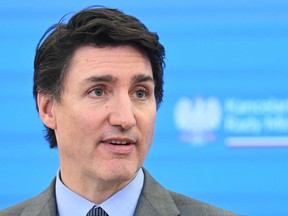Article content
Canada is set to introduce escalating retaliatory counter-tariffs to try to turn Americans against United States President Donald Trump’s 25 per cent levies on Canadian goods, a threat that’s causing the country to rethink its dependence on its southern neighbour.
Article content
“You will find when we do respond, at least initially, that we will focus on tariffing American goods that actually are sold in significant quantities in Canada, and especially those for which there are readily available alternatives for Canadians,” Natural Resources Minister Jonathan Wilkinson said in an interview on Friday, hours after Trump reiterated his plan to bring in tariffs on Canada, Mexico and China.
Article content
The comments imply that Canada’s first measures in a trade war would aim to insulate consumers while trying to dent U.S. exporters’ income enough to create political pressure for U.S. representatives and, ultimately, Trump.
Former Finance Minister Chrystia Freeland, a candidate to succeed Justin Trudeau as prime minister, suggested hitting Trump ally Elon Musk directly by applying a 100 per cent tariff on Tesla Inc. electric vehicles.
Canada wants to avoid tariffs, but if Trump isn’t deterred, the levies will expand “stepwise,” and ministers are “not taking anything off the table in terms of options for the future,” Wilkinson said from his office in North Vancouver.
“That would include the potential for export tariffs on things like energy and critical minerals,” he said. That leaves open the possibility of levies to drive up the cost of oil and gas for U.S. consumers and businesses, or iron ore used in American steel-making.
Wilkinson said the government will work with regional premiers — though Alberta’s conservative leader has opposed taxing exports of its crude, and it would be a politically difficult thing for t.he Canadian government to do. Energy is by far Canada’s largest export to the U.S.
An early glimpse of the effect of Canada’s strategy could be seen Friday from Maine Senator Susan Collins. The Republican posted on X that tariffs would “impose a significant burden” on her state, noting that 95 per cent of the heating oil that’s widely used in Maine is refined in Canada, and the country also provides all the jet fuel and diesel for the Bangor airbase in the state.
Article content
Canada is the biggest foreign energy supplier to the U.S., and the two countries have developed a tightly integrated network of pipelines and processing facilities in recent decades. Oil refineries in the US Midwest are especially dependent, having been built to process the heavy crude that’s most readily available from Alberta, with little ability to access alternative supplies.
The spat is prompting Canadian officials to talk with greater urgency about diversifying away from the U.S., and Wilkinson has an eye on a future in which Canada has ready export alternatives to its wealthy neighbour.
“People say ‘Well, this could be just a short-term thing,’ and maybe it is, but it also could be a long-term, structural thing,” he said.
Possible solutions include improving rail and port infrastructure to export more to other parts of the world and building a pipeline linking western Canada’s oil sands to refineries in the east, he said. The latter are currently fed by an Enbridge Inc. pipeline that crosses through the U.S., and it has proved a source of tension between the two countries.
There’s also a “renewed emphasis” on trying to figure out if there’s a way to double the capacity of LNG Canada, a massive natural gas export project that will start shipping fuel from Canada’s west coast to Asian markets this year, Wilkinson said.
Bloomberg.com
Share this article in your social network



